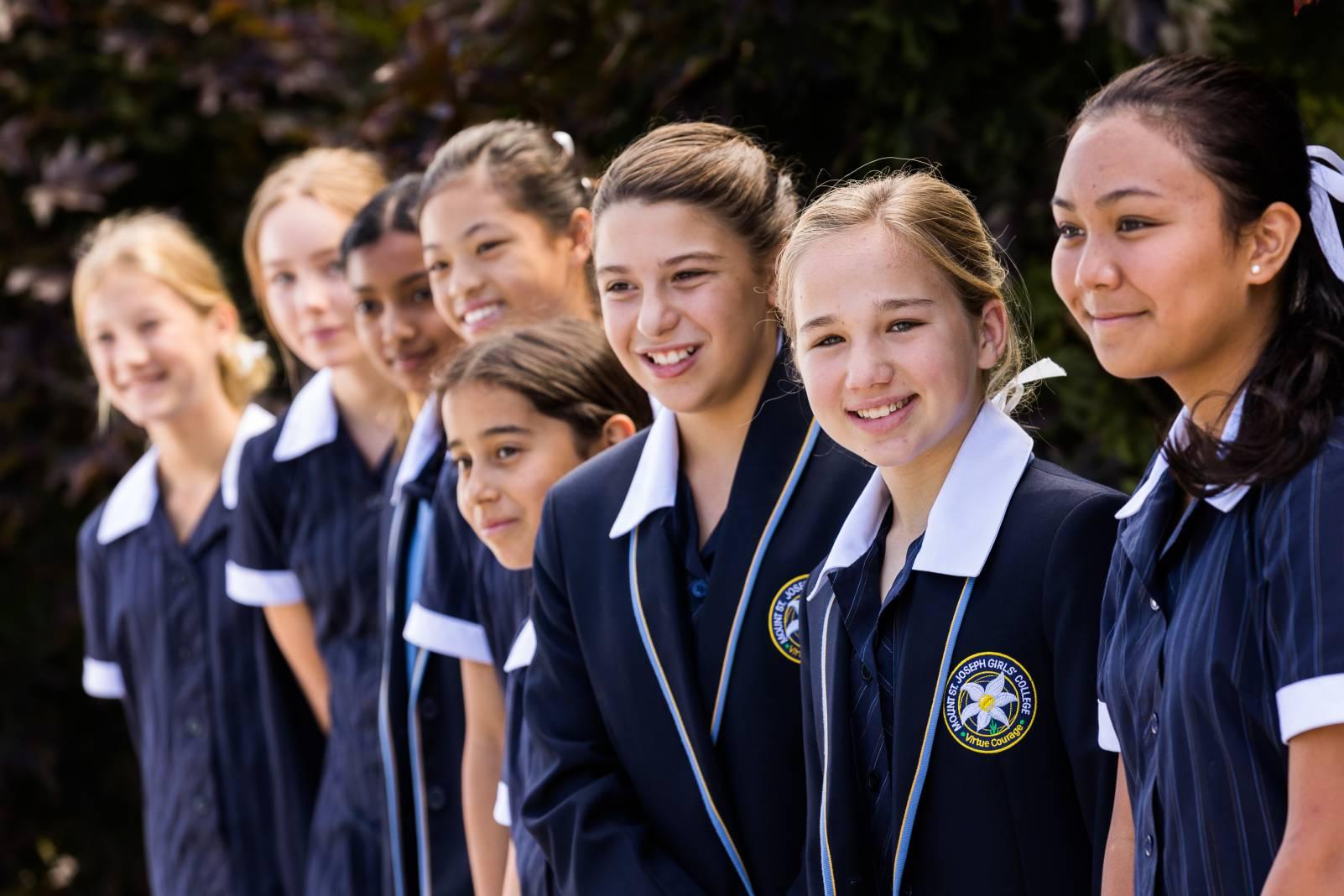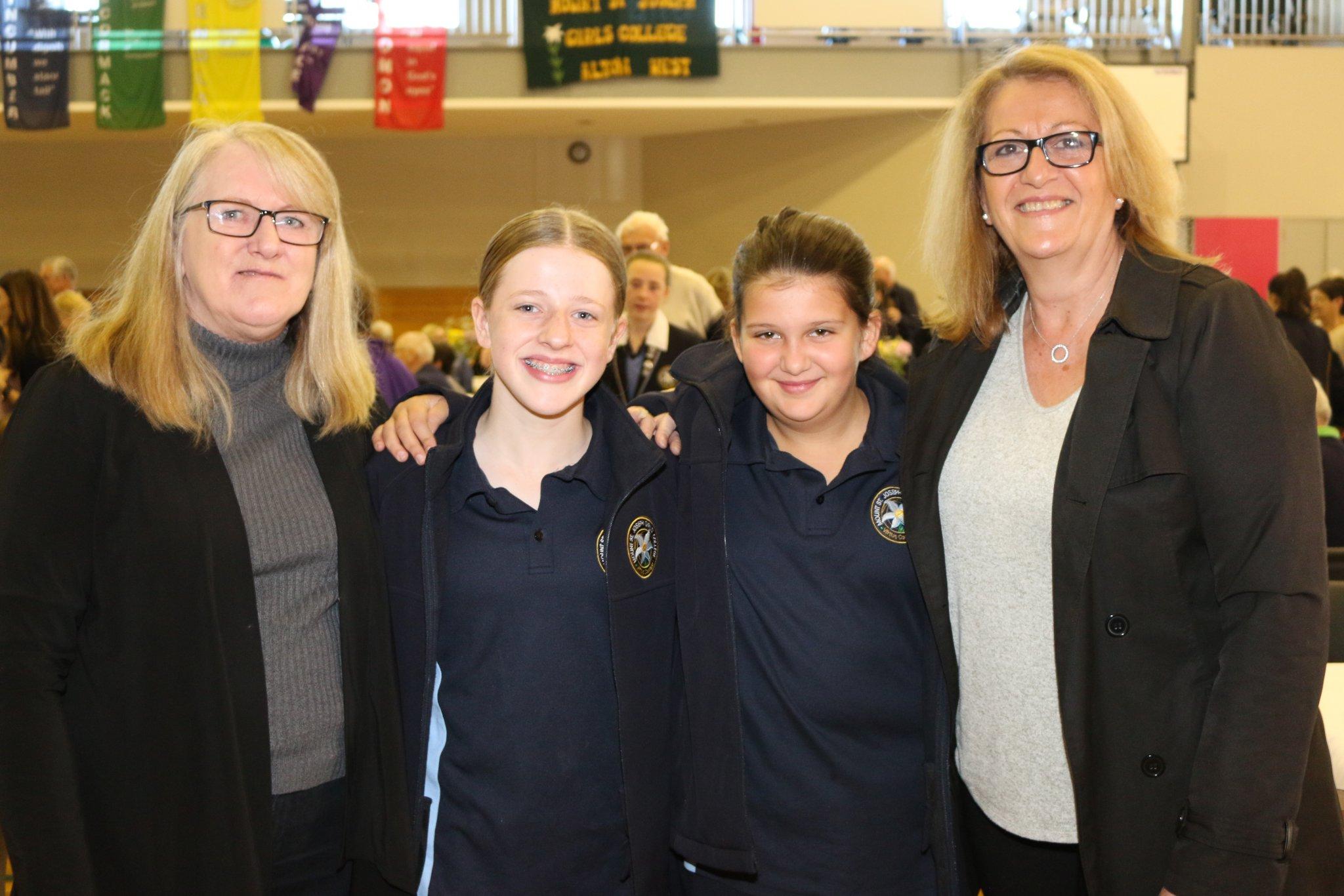In the past month, we have continued to be ignited by joy as we celebrate and immerse ourselves in community life and had the opportunity to experience the fullness of and breadth of life at Mount St. Joseph Girls’ College. Having all recovered from the success of the Debating Competitions, Grandfriends’ Morning Tea, Grade Four visits, Duke of Edinburgh Camp and the Annual Athletics Carnival, we entered Week Four of the school term with renewed energy and a commitment to work in partnership with our College community. It was so impressive to see our students engage in the recent Student Led Subject Interviews. True empowerment is evident when we can discuss our learning, goals and dialogue with our teachers and parents.
Students who engage in the many opportunities provided at MSJ are able to experience deep and positive relationships. Research indicates that those students who take advantage of a school’s co-curricula program are able to organise themselves more effectively and perform better academically. Informal relationships are formed outside the classroom and students are able to feel that they belong to this great community. I encourage each student to participate in one of the many co-curricula opportunities provided at the College. I encourage families to talk with their daughter about the various sporting, academic and environmental activities your daughter can participate in.
Grandparents' Day was a wonderful success - congratulations and thank you to the many staff who organised a true celebration. Grandparents and grandfriends play a pivotal role in the lives of our young people. They act as advocates, carers and wise elders. Please extend our thanks to your parents who could come and ‘be’ with our daughters.
What is Headspace?
Headspace is the national youth mental health foundation. The organisation works with people from 12-25, who can get health advice, support and information from headspace. With headspace centres in Sunshine, Werribee and Collingwood, students can get help with:
So they support students who:
Headspace is a place where young people can go to talk to someone about any of these issues.
'Anxiety' is like 'worry'. It's an unpleasant emotion that most people feel at some time when they're faced with challenges. Mild anxiety, like just before a sporting event or an exam, can help people perform at their best. But when anxiety becomes more intense, causes distress, lasts for a longer time and interferes with daily living, then it's a problem.
Physical feelings of anxiety include a faster heart rate, faster breathing, muscle tension, sweating, shaking, and 'butterflies in the stomach'. In a 'panic attack', these symptoms are very severe. Other common symptoms of anxiety are:
7:00pm - 8:00pm in the Tenison Woods Learning Centre on Wednesday 12 June
As part of our commitment to work with our families, Headspace Schools will hold a parent and carer information session. The topic will be Mental Health and Wellbeing in Adolescence. The session will cover:
For more information, please see this flyer
This session is not suitable for children or youths to attend.
We know that mothers and daughters share an incredible connection that needs to be nurtured.
This is an opportunity to have a deep and meaningful (D&M) with your daughter without the usual family interruptions and the chance to have this conversation guided by a psychologist and teaching staff.
This promises to be an exciting evening filled with much laughter and conversation.
“The best gift we can give one another is to be present and in the moment” as young women work through the maze of adolescence.
Crossing at Maidstone Street
Students have been reminded that the crossing in front of the College is only operational when the flags are displayed. If the flags are not displayed, students must cross with caution, as if crossing any busy road. Students cannot expect cars to stop if the flags are not displayed.
At Mount St. Joseph Girls’ College, we hold the care, safety and wellbeing of children and young people as a central and fundamental responsibility of our school. Our commitment is drawn from and inherent in the teaching and mission of Jesus Christ, with love, justice and the sanctity of each human person at the heart of the gospel (CECV Commitment Statement to Child Safety). Celebrating and affirming all young people in the Charism of the Sisters of St. Joseph of the Sacred Heart, we value the dignity and individuality of each person in our community and seek to live in a community guided by justice and fairness for all.
For our students to flourish academically and in all areas of their lives, it's important that they are happy and enjoy being at school. Their safety and physical and mental wellbeing are of paramount importance to us.
Where can I go for help?
We encourage any student who feels unsafe to confide in a trusted adult or contact the College's Child Safety Officers, Mr Steven Mifsud and Ms Stacey Bourke in person or by email: childsafety@msj.vic.edu.au
The College has a psychologist and Social Workers who are available to help students and their families. Our Wellbeing team includes psychologists, Director of Student Wellbeing, Wellbeing Leaders, Teachers and Learning Mentors.
Each term, our Child Safety Team meets to discuss how we can support and improve our practices in Child Safety. The team is led by Ms Dishon, Mrs Fairthorne, two student representatives and myself and we are now looking for two parent nominees. If you are interested in being part of our team or would like more information, please contact me at the College via phone or email: smifsud@msj.vic.edu.au We will organise meetings around the work schedules of our parent nominees.
Helpful Online & Telephone Support Services
Headspace - headspace.org.au
Youth Beyondblue - youthbeyondblue.com
ReachOut.com
Eating Disorders Foundation of Victoria - www.eatingdisorders.org.au 1300 550 236
LifeLine - 131 114
Kids Helpline - www.kidshelp.com.au 1800 551 800
Suicide Line - www.suicideline.org.au 1300 651 251
Domestic Violence Crisis Line - www.dvrcv.org.au 1800 200 526
Orygen Youth Health - www.oyh.org.au 1800 888 320
Department of Human Services - 1300 650 172
Eating Disorders - www.eatingdisorders.org.au 1300 550 236
Youth Drug & Alcohol Advice (YoDAA) - www.yodaa.org.au 1800 458 685
Use of Public Transport
Travelling to and from the College using public transport is a privilege and responsibility. This is a reminder to all students about what is expected on public transport. Please discuss these dot points with your daughter.
It is a privilege, not a right to travel on public transport in the Mount St. Joseph Girls’ College uniform. Members of the community are observing your behavior and are judging your integrity and repute. Always stand behind the yellow line on platforms and be facing the train as it comes to a halt.
Do not block doorways or aisles with school bags.
Give up your seat to adult passengers.
Talk quietly.
Do not move around the carriage.
Do not change carriages when the train stops.
Do not use connecting doors to move between carriages.
Always have a Plan B in case something goes wrong, e.g. trains or trams are cancelled.
Myki Cards
Train inspectors regularly frequent the train system. I encourage all parents to ensure that your daughter’s Myki ticket has adequate funds as fines are hefty.
Uniform
Just a reminder that students need either wear black or navy tights or white mid to long white socks with the College kilt. The kilt should be to the knee.
Restorative Practices @ MSJ
High expectations coupled with respectful relationships are at the heart of restorative practice. Building constructive relationships and ensuring students complete all set tasks is vital in promoting learning and personal wellbeing.
Restorative Practices promotes wellbeing and learner accountability. If a student does not complete homework or set tasks, it is important that the classroom teacher speaks with the student and communicates this to parents and ensures that the student produces the work at a negotiated date or time. We need to promote classrooms that support and challenge student learning. A note in the diary to a young woman’s parent or asking a student to remain at lunchtime to complete their homework creates a culture of learning and high expectations. Classrooms and learning spaces at MSJ promote a community of learning.
A learning program that promotes individual learning and success will build personal self belief and efficacy in our learners.
Steven Mifsud - Deputy Principal - Student Wellbeing






